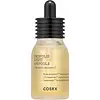What's inside
What's inside
 Key Ingredients
Key Ingredients

 Benefits
Benefits

 Concerns
Concerns

No concerns
 Ingredients Side-by-side
Ingredients Side-by-side

Propolis Extract
Skin ConditioningPortulaca Oleracea Extract
Skin ConditioningButylene Glycol
HumectantHippophae Rhamnoides Fruit Extract
Skin ConditioningPanthenol
Skin ConditioningRosa Centifolia Flower Water
Skin ConditioningNiacinamide
Smoothing1,2-Hexanediol
Skin Conditioning3-O-Ethyl Ascorbic Acid
Skin ConditioningHamamelis Virginiana Extract
AntiseborrhoeicCentella Asiatica Extract
CleansingRoyal Jelly Extract
Skin ConditioningSpirodela Polyrhiza Extract
Skin ConditioningSodium Hyaluronate
HumectantCarbomer
Emulsion StabilisingArginine
MaskingWater
Skin ConditioningDipotassium Glycyrrhizate
HumectantHydroxyethylcellulose
Emulsion StabilisingAdenosine
Skin ConditioningPropolis Extract, Portulaca Oleracea Extract, Butylene Glycol, Hippophae Rhamnoides Fruit Extract, Panthenol, Rosa Centifolia Flower Water, Niacinamide, 1,2-Hexanediol, 3-O-Ethyl Ascorbic Acid, Hamamelis Virginiana Extract, Centella Asiatica Extract, Royal Jelly Extract, Spirodela Polyrhiza Extract, Sodium Hyaluronate, Carbomer, Arginine, Water, Dipotassium Glycyrrhizate, Hydroxyethylcellulose, Adenosine
 Reviews
Reviews

Ingredients Explained
These ingredients are found in both products.
Ingredients higher up in an ingredient list are typically present in a larger amount.
1,2-Hexanediol is a synthetic liquid and another multi-functional powerhouse.
It is a:
- Humectant, drawing moisture into the skin
- Emollient, helping to soften skin
- Solvent, dispersing and stabilizing formulas
- Preservative booster, enhancing the antimicrobial activity of other preservatives
Arginine is an amino acid that is important for human development. Your body uses is it to produce hair keratin and skin collagen.
As a cosmetic ingredient, Arginine has antioxidant properties and can also help repair damaged skin. This ingredient is derived either synthetically or from animals.
Arginine isn't fungal acne safe when used in the presence of other lipids (fats, fatty acids, oils, esters, etc). Oils and fats occur naturally within the skin, so take caution when using Arginine if you're prone to fungal acne.
Learn more about ArginineButylene Glycol (or BG) is used within cosmetic products for a few different reasons:
Overall, Butylene Glycol is a safe and well-rounded ingredient that works well with other ingredients.
Though this ingredient works well with most skin types, some people with sensitive skin may experience a reaction such as allergic rashes, closed comedones, or itchiness.
Learn more about Butylene GlycolCarbomer is a polymer of acrylic acid. Its main role is to create a gel consistency.
A high amount of carbomer can cause pilling or balling up of products. Don't worry, most products contain 1% or less of carbomer.
Hydroxyethylcellulose is used to improve the texture of products. It is created from a chemical reaction involving ethylene oxide and alkali-cellulose. Cellulose is a sugar found in plant cell walls and help give plants structure.
This ingredient helps stabilize products by preventing ingredients from separating. It can also help thicken the texture of a product.
This ingredient can also be found in pill medicines to help our bodies digest other ingredients.
Learn more about HydroxyethylcellulosePanthenol is a common ingredient that helps hydrate and soothe the skin. It is found naturally in our skin and hair.
There are two forms of panthenol: D and L.
D-panthenol is also known as dexpanthenol. Most cosmetics use dexpanthenol or a mixture of D and L-panthenol.
Panthenol is famous due to its ability to go deeper into the skin's layers. Using this ingredient has numerous pros (and no cons):
Like hyaluronic acid, panthenol is a humectant. Humectants are able to bind and hold large amounts of water to keep skin hydrated.
This ingredient works well for wound healing. It works by increasing tissue in the wound and helps close open wounds.
Once oxidized, panthenol converts to pantothenic acid. Panthothenic acid is found in all living cells.
This ingredient is also referred to as pro-vitamin B5.
Learn more about PanthenolPropolis Extract is also known as bee glue.
This ingredient has antimicrobial, anti-inflammatory, wound healing, and antioxidant properties.
Studies show propolis helps fight against bacteria, viruses, and fungi. This may help with reducing acne and accelerate wound healing.
The flavonoids found in propolis extract are potent antioxidants. Antioxidants may help with reducing the signs of aging.
A study from 2020 found propolis to help reverse skin damage from UV.
Fun facts: This ingredient is created by mixing beeswax, bee saliva, and parts of trees. Bees use propolis as a sealant to close any gaps in their hives.
Since it is an animal-derived product, this ingredient is not considered vegan. For vegan alternatives, check out Galactomyces Ferment Filtrate or Centella Asiatica Extract.
Learn more about Propolis ExtractSodium Hyaluronate is hyaluronic acid's salt form. It is commonly derived from the sodium salt of hyaluronic acid.
Like hyaluronic acid, it is great at holding water and acts as a humectant. This makes it a great skin hydrating ingredient.
Sodium Hyaluronate is naturally occurring in our bodies and is mostly found in eye fluid and joints.
These are some other common types of Hyaluronic Acid:
Learn more about Sodium Hyaluronate